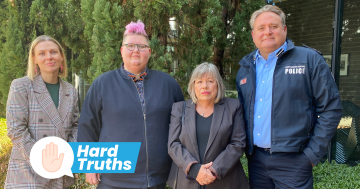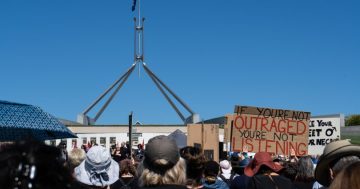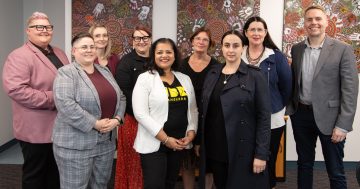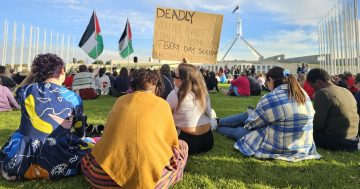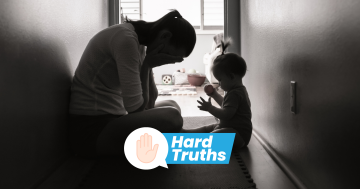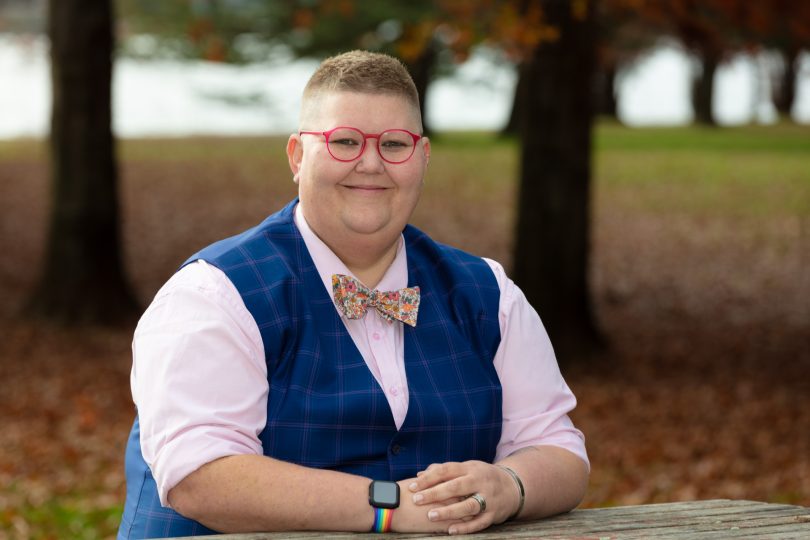
Sue Webeck is the new head of the Domestic Violence Crisis Service. Photo: Michelle Kroll.
After a very challenging year, Canberra’s Domestic Violence Crisis Service has a new General Manager.
Sue Webeck has been a champion for DVCS for some time, bravely shaving her head as part of the organisation’s major fundraiser earlier this year, and takes the reins in June.
The appointment comes at a time when the pandemic and consequent lockdowns have created huge stress in many households, and family and domestic violence reports are on the rise.
About 216 people a day contacted DVCS between July 2020 and April this year and over the last 12 months, more than 4000 clients received support.
Ms Webeck has spent much of her career in the community sector – most recently at the ANU where she was the Respectful Relationships Unit Manager. She has also been the Burgmann College dean, deputy executive director of the AIDS Action Council of the ACT and has been a director of the Canberra Rape Crisis Centre, Youth Coalition of the ACT and ACT Education Primary School boards.
Ms Webeck said the principals and values at DVCS align very clearly with her personal ethics and work history.
“It’s not often you get the opportunity to work with such a skilled dynamic and impactful team as DVCS,” she said.
“Primary prevention is great but we are not prepared for that as a society yet. We still need an incredibly solid response service to the crisis of domestic and family violence as well as the preventative work we do.
“We can’t continue to exist in a world that’s not centred on respect at the core of where we interact with each other”
Ms Webeck agrees that this last year has been a hard one for many people.
“We’re seeing the impacts of isolation and lack of community connectedness – this has not been an easy time at all,” she said.
“The ACT is a unique environment where we have a large chasm between privilege – those who are thriving – and those who are just surviving. We don’t always own our privilege and explore others’ access needs.”
Homelessness, for example, has significant connections with family and domestic violence and people who might never have imagined they wouldn’t have a roof over their heads can find themselves in desperate need.
“We run a risk in the ACT in that those who are in need can become invisible very quickly. That’s come to the surface in the last 12-18 months,” she said.
She’s also aware that difficult times like these have a major impact on staff and nominates ensuring their needs are met, their concerns heard and their successes celebrated as a major priority.
To that end, there’s a big agenda around establishing effective collaborations with others in the sector – from government agencies and services to Members of the Legislative Assembly who have particular interests in the area, the Chief Police Officer, the Canberra Rape Crisis Centre and Canberra women’s shelters.
DVCS also has an enduring interest in contributing to behaviour change for those who are using violence and want to stop. Support services are available for everyone, but Ms Webeck is also clear that while anyone can be a victim or a perpetrator, domestic and family violence remains a gendered issue.
“Overwhelmingly, women and children are victims and the perpetrators of that violence are men”, she said.
“But we do need to be ready and available to have the conversation about what it looks like for male survivors.
“We also can’t shy away from research that says LGBTQI+ communities, culturally and linguistically diverse communities, Aboriginal and Torres Strait Islanders and people with disabilities experience violence at significantly higher rates than the rest of society.
“Often they are also terrifyingly under-represented in service access. A key priority for inclusive and responsive services is to work with community to build connection and trust.
“We have to ensure that anyone who is marginalised, experiencing violence or at risk of using it, knows that this is a safe and inclusive place for them to come”.
If you or someone you know is impacted by sexual assault, domestic or family violence, you can call or visit:
1800RESPECT: 1800 737 732
The Canberra Rape Crisis Centre: 02 6247 2525
The Domestic Violence Crisis Service ACT: 02 6280 0900
Lifeline: 13 11 14
In an emergency call 000.












